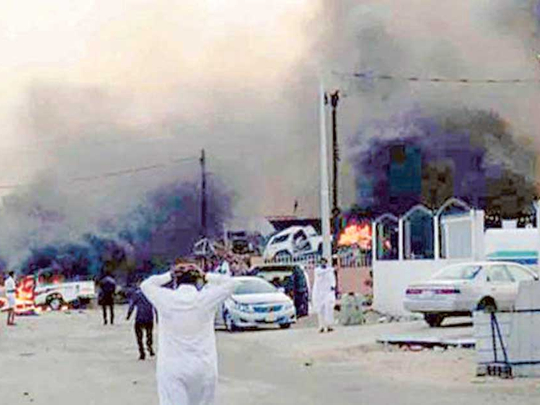
Dubai: Iran-backed Al Houthi militias and forces loyal to former president Ali Abdullah Saleh used peace talks in Kuwait to regroup themselves and prepare for more fierce battles in Yemen, analysts have said.
While the internationally-recognised Yemeni government of Abd Rabbo Mansour Hadi offered some concession during the talks, Al Houthis and their allies refrained from showing any intention to reach a peaceful settlement, analysts added.
“When Al Houthis went to the talks, they had in mind of buying time and distracting the international community and the Arab coalition in their efforts to find a serious solution,” said Fadel Al Rubei, a Yemeni political analyst based in Aden.
“When Al Houthis went to the talks, they were planning to regroup themselves and reinforce their positions on the ground,” he added to Gulf News. “Actually, the military option is going to be the most prominent (in the near future), and we are expecting to witness an escalation in violence whether near the Saudi border or in the ongoing battles inside Yemen,” said Mahmoud Azzani, a UK-based Yemeni political analyst, in an interview with Gulf News.
The Kuwait talks, which started in April with the aim of finding a peaceful end to the Yemeni civil war, broke down on July 7.
Since then, an escalation in the military operations was recorded on the ground.
“It seems that the political option faced a deadlock because of the high ambitions of Al Houthis and their allies, which is known for all and say that they are not willing to accept anything less than being the biggest winner, or the only winner from the talks,” explained al Azzani.
Because of that, Al Houthi militias and their supporters have not offered any concession in the talks.
The government, on the other hand, has accepted that Al Houthis to withdraw from Sana’a, Taiz and Hudaidah governorates and to hand over their heavy weapons as a first phase before fully implementing the UN Security Council resolution 2216, which calls for their total withdrawal from all their positions across Yemen.
‘This is a very big concession ... Principle says that those who were behind the coup and using weapons should not be awarded,” said Al Azzani.
“The negotiations period in any conflict is considered a period for all parties to reorganise themselves,” said Eman Ragab, a security researcher in Cairo-based Al Ahram Strategic Studies Centre. “It seems that talks in Kuwait and what was offered had made Al Houthis rearrange their position with the aim of changing the power scale to improve their negotiation position,” she added to Gulf News.
The war started in March 2015 to reinstate Hadi’s government. The conflict has killed thousands of people in the country, according to UN estimates.
“Despite the attempts of Al Houthis to impose their will and change facts on the ground, they will not succeed,” said Al Rubie.
“The government still can use the liberated southern part of the country and move to the north,” where Al Houthis are positioned,” he added.












